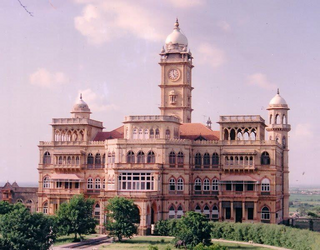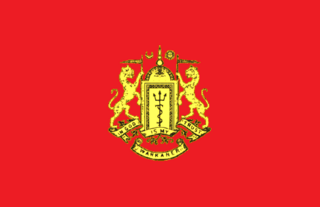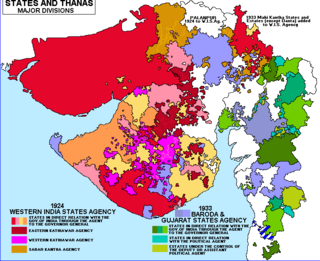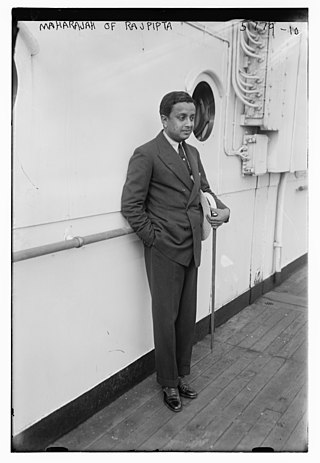Captain Sir Amarsinhji Banesinhji KCSI KCIE (4 January 1879 – 25 June 1954) was the Maharana Raj Sahib of Wankaner from 12 June 1881 until his death on 28 June 1954.
Captain Sir Amarsinhji Banesinhji KCSI KCIE (4 January 1879 – 25 June 1954) was the Maharana Raj Sahib of Wankaner from 12 June 1881 until his death on 28 June 1954.
Amarsinhji was born on 4 January 1879 to Banesinhji, whom he succeeded in his titles and dignity as Maharana Raj Sahib of Wankaner at the mere age of two, on 25 June 1881, in the presence of Colonel Nutt, the then Assistant Political Agent of Jhalawad. [1] [2] [3] Owing to his minority, the Wankaner State was placed under Agency management. [1] [4] He was educated at Rajkumar College, Rajkot, where he was placed under the care of Chester Macnaghten and C.W. Waddington. [1] [4] He won the Fergusson Gold Medal for English-speaking there. [5] After completing his studies at the College, in 1898 he visited the principal cities of India and Ceylon (Sri Lanka). [1] [4] In the same year, he visited England [1] along with F. de B. Hancock and spent four months there, followed by a visit to Paris, France, before finally returning to Wankaner on 22 October 1898. [4]
The long minority came to an end on 18 March 1899 [4] when he was invested with the full powers of government at a Durbar by J.M. Hunter, the then Political Agent in Kathiawar. [1] [6] Soon after he took over, the Wankaner State experienced a severe famine in 1900. [6] He handled it well by providing generous and careful relief efforts, which saved the bhayats and ryots from starving and losing everything. [6] [7] As insurance against the famine, he constructed two irrigation tanks: one at Vadsar, known as the Jaswantnagar Tank, named after his grandfather, and another at Mesariya, named Vinaysagar, after his father. [1] [6]
He was highly interested in education. [6] He made primary education free and set up scholarships for students who, after completing high school, wished to pursue college studies in Arts, Engineering, or Medicine. [6] He attended the Viceroy's Durbar at Rajkot in November 1900. [8] He attended the Delhi Durbar in 1911, where he was personally made a Knight Commander of the Order of the Indian Empire by George V. [4] [6]
A well-educated and progressive ruler, he took an interest in improving the welfare of his subjects. He established the first Farmers' Co-operative Bank in Saurashtra to provide finance to farmers, promoted agriculture, as well as the dairy and textile industries. He also introduced village self-government schemes, the first pensions for state employees, reformed the public services and a strong and effective police force.[ citation needed ]
A gifted sportsmen, he excelled in badminton, cricket and marksmanship. He also took an interest in motoring, aircraft and architecture, building several palaces and public buildings in Wankaner and Wankaner House in Bombay. He celebrated his Golden Jubilee on 31 May 1931.[ citation needed ]
During the World War I, he placed the entire resources of his State at the disposal of the Government and saw active service. [9] He with the Kathiawar Motor Ambulance Corps in Flanders. [9] [10] The temporary rank of Captain was conferred on him while at the front, and it was made permanent on 1 January 1918. [4] [8] On the same date, for his services during the war, he was granted a personal salute of 11 guns, which was made permanent in 1931. [4] [8]
On 15 August 1947, Amarsinhji signed the Instrument of Accession, whereby the Wankaner State acceded to the Dominion of India. [11] This accession was accepted by Lord Mountbatten, the then Governor-General of India, on 16 August 1947. [11]
He managed a paddock in his state to breed high-quality country-bred and Kathiawari horses. [6] Each year, the Government Army Remount Agents purchased horses from the paddock. [6] In 1901, the Royal Commission on Horse-Breeding visited and praised the paddock's management and the quality of the horses. [6]
In 1951, Shree Amarsinhji Mills Limited, a cotton textile mill named after him, was established by his son, Pratapsinhji Jhala, in Wankaner. [12] However, in 1980, the mill was taken over by Kores India. [13] His grandson, Digvijaysinh Jhala, served as its director from 1960. [14]
He died on 28 June 1954, and his eldest son, Pratapsinhji Amarsinhji, succeeded him as the Maharana Raj Sahib of Wankaner. [15]
| Country | Year | Honour | Grade | Class | Ribbon | Post-nominal letters |
|---|---|---|---|---|---|---|
| 1903 | Delhi Durbar Medal (1903) | Gold | | |||
| 1911 | Delhi Durbar Medal (1911) | Gold | | |||
| 1911 | Order of the Indian Empire | Knight Commander | | KCIE | ||
| 1918 | 1914–15 Star | | ||||
| 1918 | British War Medal | | ||||
| 1918 | Victory Medal 1914–19 | | ||||
| 1935 | King George V Silver Jubilee Medal | | ||||
| 1936 | Order of the Star of India | Knight Commander | | KCSI | ||
| 1937 | King George VI Coronation Medal | | ||||
| 1947 | Indian Independence Medal | |

Maharaja Raol Sir Takhtsinhji JaswantsinhjiKIH, was Maharaja of Bhavnagar, a Rajput chief of the Gohil clan, and ruler of Bhavnagar state in Kathiawar. He succeeded to the throne of Bhavnagar upon the death of his father, Jaswantsinhji, in 1870.

Durbar is a Persian-derived term referring to the noble court of a king or ruler or a formal meeting where the king held all discussions regarding the state. It was used in South Asia for a ruler's court or feudal levy. A durbar may be either a feudal state council for administering the affairs of a princely state, or a purely ceremonial gathering, as was increasingly the case during British rule in India.

Lieutenant-Colonel Maharaja Rana Shri Sir Natwarsinhji Bhavsinhji Sahib Bahadur, KCSI was the last Maharaja of Porbandar belonging to Jethwa dynasty, who ascended the throne of princely state of Porbandar on 10 December 1908 and ruled until his state was merged into India on 15 February 1948.

Wankaner is a city and a municipality in Morbi district in the State of Gujarat. Until 2013, Wankaner was part of the Rajkot district.
Kotharia is a town in Rajkot district of Gujarat, which was a small princely state offshoot of the Rajkot state in the Saurashtra region of Gujarat, part of the Bombay Presidency during British Raj.

Bhagvatsinhji was the ruling Maharaja of the princely state of Gondal from 1869 till his death in 1944, upon which he was honoured with 11-gun salute. He was the only Maharaja of Gujarat to take a medical degree and other degrees.

Sir Digvijaysinhji Ranjitsinhji Jadeja, known to some as the Good Maharaja, was the Maharaja Jam Sahib of Nawanagar from 1933 to 1966, succeeding his uncle, the famed cricketer Ranjitsinhji.
HH Shri Shaktimant Jhaladhipati Mahamandleshwar Maharana Sriraj Maharaja Sir Shri Mayurdwajsinhji Meghrajsinhji III Ghanshyam Sinhji Bahadur, KCIE, FRAS, FRAI, FRHistS was the last ruling Maharaja of Dhrangadhra-Halvad. He was an academic, politician, member of several distinguished academic bodies, and one of the last surviving rulers of the former princely states of the British Raj. He was also the last surviving knight of the Order of the Indian Empire and the last of either of the chivalric orders of the British Indian Empire.

Saurashtra State, formally known as United State of Kathiawar and later United State of Saurashtra, was a State of India that existed between 1948 and 1956, on Saurashtra alias Kathiawar peninsula, with Rajkot as its capital,

Wankaner State was one of the princely states of India in the historical Halar region of Kathiawar during the period of the British Raj. It was an eleven gun salute state belonging to the Kathiawar Agency of the Bombay Presidency. Its capital was in Wankaner, located in Rajkot district, Gujarat state. Most of the territory of the state was mountainous.

The Baroda, Western India and Gujarat States Agency was an agency of the Indian Empire, managing the relations of the Provincial Government of the Bombay Presidency with a collection of princely states.
Lincoln House, owned by billionaire Cyrus Poonawalla, is a 50,000 sq foot heritage property located at 78, Bhulabhai Desai Road, in the billionaires row of Mumbai, India.
This article details events occurring in the year 1839 in India. Major events include the reduction of the Khanate of Kalat to a subsidiary ally of the British, and the capture of Aden in Yemen by the East India Company, creating an important stopover for voyages between Europe and India.
Digvijaysinh Pratapsinhji Jhala was an Indian politician from Gujarat. He served as India's first environment minister in the central government.
H.H. Maharana Raj Shri Banesinhji Jaswantsinhji Sahib was the Maharana Raj Sahib of Wankaner belonging to Jhala dynasty, who ascended the throne of princely state of Wankaner in 1860 upon death of his grandfather, Maharana Raj Shri Wakhatsinhji Chandrasinhji and ruled until his death in 1881. His father Kumar Shri Jaswantsinhji Vakhatsinhji Sahib was the eldest son of Maharana Raj Shri Wakhatsinhji Chandrasinhji, who died in 1844. He was succeeded by his son, Amarsinhji Banesinhji. He was educated privately and was a progressive and modern ruler who introduced the first reforms and innovations in administrations, revenue collection, justice, public works and police matters. Unfortunately, much of his reign was spent in battling against the twin scourges of drought and famine. He was recipient of Prince of Wales' Medal - 1875, and Kaiser-i-Hind Medal - 1877.
Jhalawad(zalawad)(rajput) was the northernmost of the four prants into which the many feudal units of Kathiawar on Saurashtra peninsula in present Gujarat were divided, the others being Halar (west), Gohelwar (southeast) and Sorath (south).
Captain Maharana Raj Shri Pratapsinhji Sahib was last official Maharana Raj Sahib of Wankaner belonging to Jhala dynasty from 28 June 1954 till 28 December 1971, when India abolished official symbols of princely India, including titles, privileges, and remuneration, privy purses. He was son of Captain Maharana Raj Shri Sir Amarsinhji Banesinhji Sahib, the Maharana Raj Sahib of Wankaner.
Zalim Singh (1739-1824), sometimes refer as Zalim Singh Jhala or Zalim Singh of Kotah, a Jhala rajput, was an administrator, reformer and army commander of Kota state. He was the de facto ruler of Kota State from 1771 to until his death in 1824. He was referred to by his contemporary James Tod as the Machiavelli of Rajasthan.

Vijaysinhji Chhatrasinhji GBE KCSI, was the last Maharaja of the Rajpipla State, who ruled from 1915 to 1948. He was also a successful race horse owner, a socialite and an accomplished horseman and a polo player. He played a key role in the negotiations leading to the integration of several Princely state’s into the Indian Union. Some articles refer to him as Vijayasinhji instead of Vijaysinhji.

Ranjit Vilas Palace is the principal palace and, until 2012, the residence of the royal family of the princely state of Wankaner in what is now the Indian state of Gujarat.